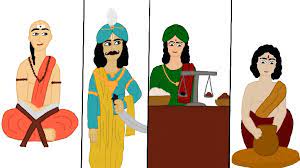Ahmedabad
(Head Office)Address : 506, 3rd EYE THREE (III), Opp. Induben Khakhrawala, Girish Cold Drink Cross Road, CG Road, Navrangpura, Ahmedabad, 380009.
Mobile : 8469231587 / 9586028957
Telephone : 079-40098991
E-mail: dics.upsc@gmail.com

Acknowledging Casteism in the Indian Society
Context: This editorial highlights the need to Acknowledge casteism in the Indian society in order to ensure true representation, equality and inclusion of the marginalized.
What is Casteism?
• Casteism is a term that refers to the discrimination, prejudice, or oppression based on one’s caste, which is a system of social hierarchy in India.
What efforts have been made to eliminate Caste based discrimination in India?
• Articles 15 and 17 specifically address the prohibition of discrimination based on caste.
• Article 46 - This article directs the state to promote the educational and economic interests of SCs, STs, and other weaker sections and protect them from social injustice and exploitation.
• Laws like the Scheduled Castes and the Scheduled Tribes (Prevention of Atrocities) Act, 1989, provide protection against violence and discrimination faced by marginalized communities.
• Prohibition of Employment as Manual Scavengers and their Rehabilitation Act, 2013
• Affirmative Action through Reservations in Education and Employment for SC, ST and OBC community.
Why does Caste based discrimination exist even today in the Indian Society?
• Historical Roots - The caste system has been an integral part of Indian society for centuries, with its origins in ancient religious texts. Over time, it has become deeply ingrained in the social fabric, making it challenging to eradicate completely.
• Social Hierarchy - The caste system places people into a hierarchical structure, where some castes are considered superior and others inferior. This hierarchy creates a sense of entitlement among higher castes and leads to the marginalization and discrimination of lower castes.
• Economic Disparities - Historically, certain castes were assigned specific occupations, which led to economic disparities. Even though modernization and urbanization have opened up opportunities, the effects of historical occupation-based discrimination still impact the socio-economic conditions of lower castes.
• Political Exploitation - Caste-based identity is often exploited by political parties to garner votes and maintain power. This can lead to the perpetuation of caste divisions for political gain.
• Social Norms and Prejudices - Cultural norms and prejudices are deeply rooted and can take generations to change. People's attitudes toward caste and caste-based discrimination are influenced by these societal norms.
• Resistance to Change - Some individuals and communities may resist efforts to eliminate caste-based discrimination, fearing a loss of social status or privileges that the current system affords them.
• Urban-Rural Divide - While urban areas may be more progressive, rural areas often adhere more strongly to traditional norms and practices, including caste-based discrimination.
What is Decasting in India? What are the steps to achieve Decasting in India?
• 'Decasting' is a term used to describe efforts and initiatives aimed at dismantling or eradicating the castebased system of discrimination and hierarchy in Indian society. It refers to the process of challenging and eliminating the social, economic, and political inequalities that have been historically perpetuated by the caste system.
• The steps to achieve Decasting in India include i) Acknowledging the presence and impact of casteism in the society rather than denying it ii) Educating younger generations of seeing beyond caste and promoting inclusivity iii) Celebrating and embracing Dalit history iv) Emphasizing on representation beyond reservations and v) Building Trust in the society.

Address : 506, 3rd EYE THREE (III), Opp. Induben Khakhrawala, Girish Cold Drink Cross Road, CG Road, Navrangpura, Ahmedabad, 380009.
Mobile : 8469231587 / 9586028957
Telephone : 079-40098991
E-mail: dics.upsc@gmail.com
Address: A-306, The Landmark, Urjanagar-1, Opp. Spicy Street, Kudasan – Por Road, Kudasan, Gandhinagar – 382421
Mobile : 9723832444 / 9723932444
E-mail: dics.gnagar@gmail.com
Address: 2nd Floor, 9 Shivali Society, L&T Circle, opp. Ratri Bazar, Karelibaugh, Vadodara, 390018
Mobile : 9725692037 / 9725692054
E-mail: dics.vadodara@gmail.com
Address: 403, Raj Victoria, Opp. Pal Walkway, Near Galaxy Circle, Pal, Surat-394510
Mobile : 8401031583 / 8401031587
E-mail: dics.surat@gmail.com
Address: 303,305 K 158 Complex Above Magson, Sindhubhavan Road Ahmedabad-380059
Mobile : 9974751177 / 8469231587
E-mail: dicssbr@gmail.com
Address: 57/17, 2nd Floor, Old Rajinder Nagar Market, Bada Bazaar Marg, Delhi-60
Mobile : 9104830862 / 9104830865
E-mail: dics.newdelhi@gmail.com